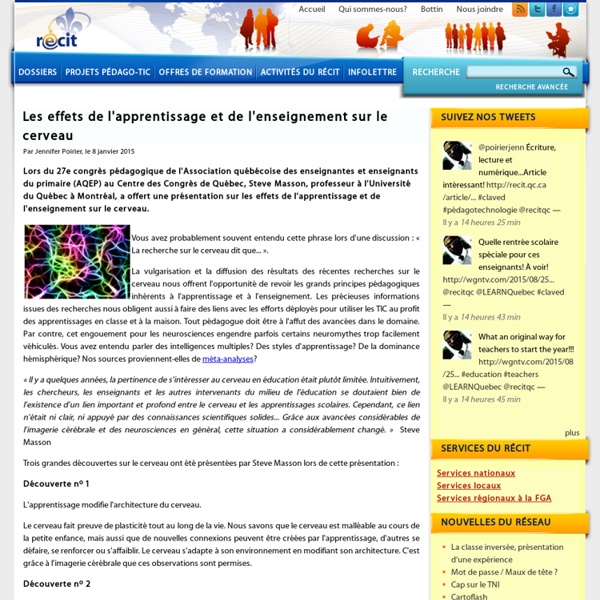Les effets de l'apprentissage et de l'enseignement sur le cerveau

The Neuroscience Behind Stress and Learning
The realities of standardized tests and increasingly structured, if not synchronized, curriculum continue to build classroom stress levels. Neuroimaging research reveals the disturbances in the brain's learning circuits and neurotransmitters that accompany stressful learning environments. The neuroscientific research about learning has revealed the negative impact of stress and anxiety and the qualitative improvement of the brain circuitry involved in memory and executive function that accompanies positive motivation and engagement. The Proven Effects of Positive Motivation Thankfully, this information has led to the development of brain-compatible strategies to help students through the bleak terrain created by some of the current trends imposed by the Common Core State Standards and similar mandates. In the past two decades, neuroimaging and brain-mapping research have provided objective support to the student-centered educational model. Neuroimaging and EEG Studies
Metacognition: Nurturing Self-Awareness in the Classroom
How do children gain a deeper understanding of how they think, feel, and act so that they can improve their learning and develop meaningful relationships? Since antiquity, philosophers have been intrigued with how human beings develop self-awareness -- the ability to examine and understand who we are relative to the world around us. Today, research not only shows that self-awareness evolves during childhood, but also that its development is linked to metacognitive processes of the brain. Making Sense of Life Experiences Most teachers know that if students reflect on how they learn, they become better learners. For example, some students may think and process information best in a quiet library, while others may focus better surrounded by familiar noise or music. Metacognition plays an important role in all learning and life experiences. How do I live a happy life? Through these reflections, they also begin to understand other people's perspectives. Image Credit: Marilyn Price-Mitchell 1.
Project-Based Learning vs. Problem-Based Learning vs. X-BL
At the Buck Institute for Education (BIE), we've been keeping a list of the many types of "_____- based learning" we've run across over the years: Case-based learning Challenge-based learning Community-based learning Design-based learning Game-based learning Inquiry-based learning Land-based learning Passion-based learning Place-based learning Problem-based learning Proficiency-based learning Service-based learning Studio-based learning Team-based learning Work-based learning . . . and our new fave . . . Zombie-based learning (look it up!) Let's Try to Sort This Out The term "project learning" derives from the work of John Dewey and dates back to William Kilpatrick, who first used the term in 1918. Designing and/or creating a tangible product, performance or event Solving a real-world problem (may be simulated or fully authentic) Investigating a topic or issue to develop an answer to an open-ended question Problem-Based Learning vs. Problem-based learning typically follow prescribed steps:
projet de neuroéducation
Related:
Related:



